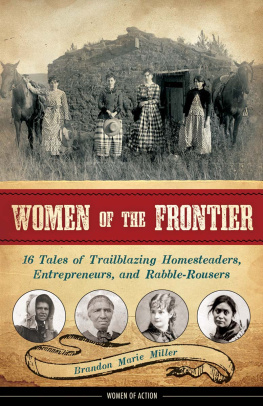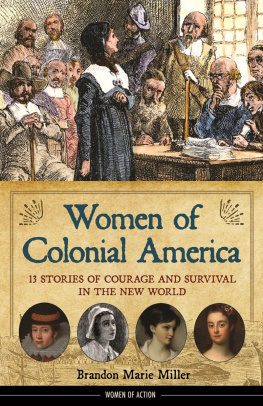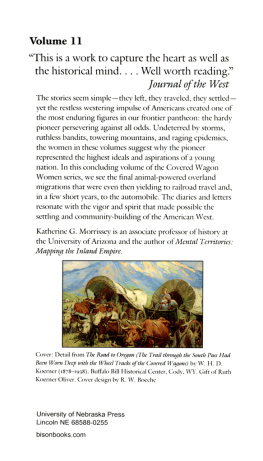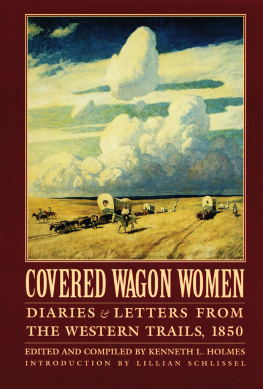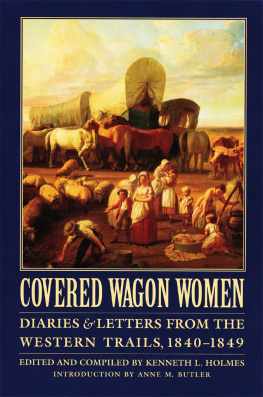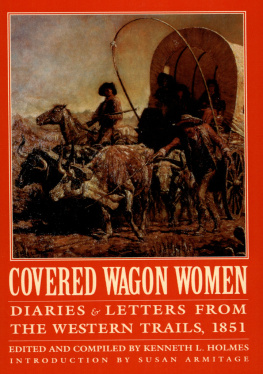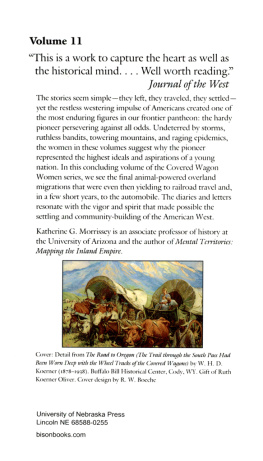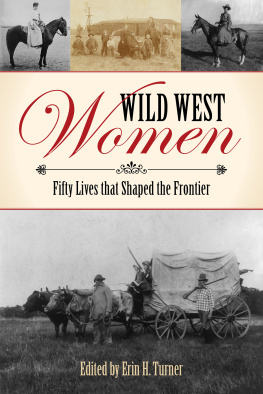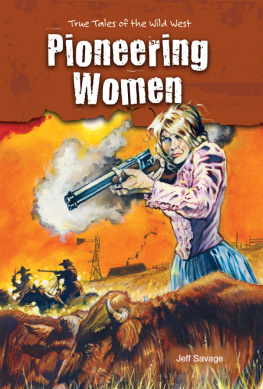
OTHER BOOKS IN THE WOMEN OF ACTION SERIES
Double Victory: How African American Women Broke Race and Gender Barriers to Help Win World War II
Women Heroes of World War II: 26 Stories of Espionage, Sabotage, Resistance, and Rescue
Copyright 2013 by Brandon Marie Miller
All rights reserved First edition
Published by Chicago Review Press, Incorporated
814 North Franklin Street
Chicago, Illinois 60610
ISBN 978-1-883052-97-3
Parts of this work were originally published as Buffalo Gals: Women of the Old West (Minneapolis, MN: Lerner Publishing, 1995). They have been substantially revised, updated, and expanded.
Interior design: Sarah Olson
Map design: Chris Erichsen
Library of Congress Cataloging-in-Publication Data
Miller, Brandon Marie.
Women of the frontier : 16 tales of trailblazing homesteaders, entrepreneurs, and rabble-rousers / Brandon Marie Miller. 1st ed.
p. cm.
Includes bibliographical references and index.
ISBN 978-1-883052-97-3 (hardcover)
1. Women pioneersWest (U.S.)HistoryBiographyJuvenile literature.
2. West (U.S.)HistoryBiographyJuvenile literature. I. Title.
CT3262.W37M55 2013
978.033082dc23
2012035756
Printed in the United States of America
5 4 3 2 1

For Paul, with love (Boy Justin and Tom, too. Now Ive gotten to everyone!)
CONTENTS

AUTHORS NOTE

As I researched this book, I often wondered how Id react to the conditions these frontier women dealt with. At best, Im afraid I would have complained a lot; at worst, I would have given up, running back to Ohio if so much as a snake fell through the roof of my sod house.
But the women on these pages persevered. Margret Reed and Rachel Plummers stories haunted me. The determination of Luzena Wilson and Dr. Bethenia Owens-Adair humbled me. The eloquence of Susette La Flesches fight for Native American rights moved me. And Carry Nation, whom I prejudged as a prudish old Puritan, made me laugh.
Most of the women here were not famous; they led ordinary lives as daughters, sisters, wives, and mothers. Thousands more shared these same stories but left no written record and today are nameless and forgotten. I pay tribute to every one of them.
1
MANY A WEARY MILE

I have not told you half we suffered. I am not adequate to the task.
Elizabeth Smith Geer, the trails end, 1847

Not long after sunrise on a May day in 1841, a dozen jam-packed covered wagons rumbled out of a small town along the Missouri River. Ox teams pulled the wagons steadily westward toward the Pacific coast, carting the baggage of 69 men, women, and children. Dawn rose behind their backs, but that night the sun would set ahead of them, a sign of hope beyond the horizon. They were the first trickle in a flood of pioneers, lured by the promise of better lives in the American West.
Americans had always looked west for escape and refuge. The lure of Western lands symbolized health, wealth, and freedom. In 1837, the United States plunged into an economic depression as banks closed their doors and thousands of unemployed workers crowded Eastern cities. Farm prices plummeted, and many people lost their land. Adding to the sense of despair were the yellow fever, malaria, typhoid, and tuberculosis that ravaged the country year after year.
Eastern audiences devoured the published journals of fur trappers and explorers, in awe over their glorified western adventures. Letters from Oregon missionaries excited trouble-weary Americans. To many readers, the missionaries tales of religious zeal paled next to their descriptions of rich farmland and forests, crystal waters abundant with fish, and hordes of animals awaiting fur trappers. News of miraculous cures in the Wests pristine air offered great hope. Societies sprang up to encourage settlement of the Oregon country and California, too, praised as an earthly paradise of sunshine and lush fruit. One woman summed up the dreams of many: We had nothing to lose, and we might gain a fortune.
The temptation of cheap land in paradise proved hard to resist. During the spring of 1842, another 200 people traveled west. A year later, 1,000 optimistic settlers braved the journey. After the 1848 discovery of gold in California, the numbers exploded to 30,000 in 1849 and 55,000 in 1850. The Wilson family abandoned their Missouri farm in 1849 for the California gold fields: So we came, wrote wife Luzena, young, strong, healthy, hopeful, but penniless, into the new world. Thousands of European immigrants, mainly from Germany, the British Isles, and Scandinavia, also joined the hopefuls heading west.
Most pioneers, especially those heading to the goldfields of California, were single men. But families and a handful of single women undertook the western journey, too. Of the 50,000 people journeying west in 1852, about 7,000 were women.

John Sutters mill, Sacramento, California. The discovery of gold here led to a gold rush of emigrants. From Story of the Great Republic by Helene Guerber
To meet the emigrants needs, publishers churned out manuals like The National Wagon Road Guide and The Emigrants Guide to Oregon and California. Unfortunately, too many guidebooks proved dangerously unreliable. One manual even assured readers that notions of toil, hardship, and danger on the trail grew from their own fruitful imagination. And though women, too, studied the manuals, the books offered hardly a word of advice for female pioneers. Women were left to discover on their own how to cook, clean, dress, camp, and care for children on the long adventure.
Usually, the man of the household decided to pull up stakes and move his family west. While women shared the hope for a better life, many found it painful to leave their homes and sever ties, perhaps forever, with family, friends, and communities. Pushing beyond the established boundaries of the United States, early pioneers were emigrants to a foreign, mostly uncharted, land. California and the Southwest belonged to Mexico. The United States and Great Britain both claimed the Oregon Country, an area so large it included six future states. These faraway lands were already the home of Native Americans and people of Spanish decent. White Americans often viewed both groups with a mixture of fear and scorn.
A womans journey west carried an added burden, coming at a time of life when she might be pregnant or caring for young children. The prospect of abandoning society to face months of heat, dust, storms, and savage Indians filled many women with dread and misgivings. I have been reading the various guides of the route to California, wrote Lodisa Frizzell. They have not improved my ideas of the
Next page
